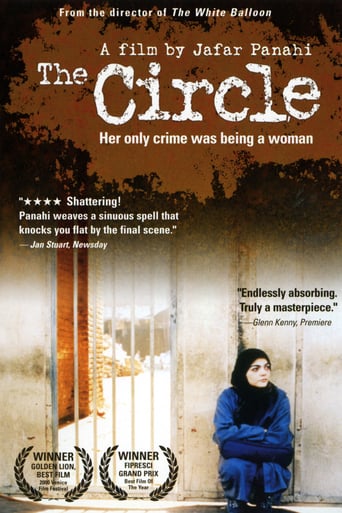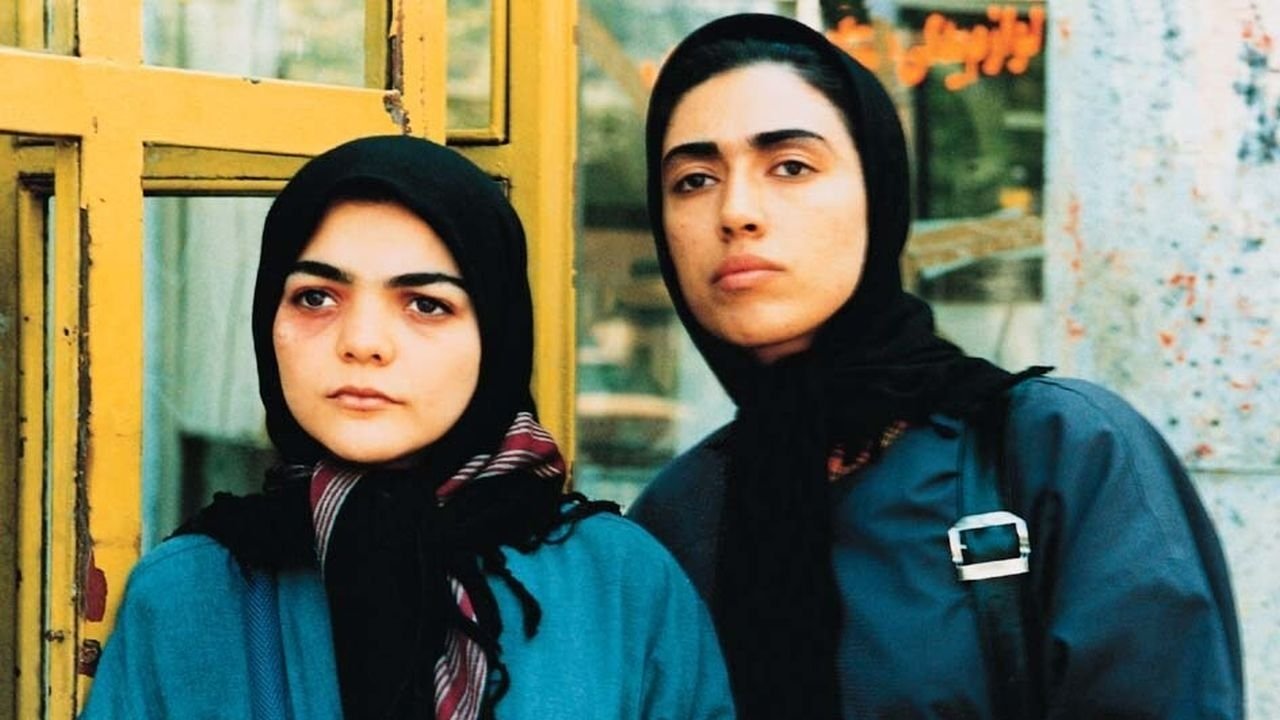allonsegev
Artistic seen, it's a peculiar work of art: the movie doesn't stick to one character, but it rather unfolds the story through few characters that embody the one main figure on which the movie concentrates, namely, the woman or the fate of the woman in the Islamic Republic of Iran. The life span or the "circle" of the woman in Iran opens with her cursed fate of having been born as a woman, continues to her mature life in subjugating patriarchal society, being subjugated to the whims of her "masculine owner", and lastly closes with her being incarcerated for not gratifying her husband.The movie is so designed that only in retrospect it is fully comprehended - only by looking backward on the entire seen movie, it can be fully understood.Jafar Pahani has paid heavily for his uncompromising artistic work and courageous critique of the tyrannic regime - he was judged last year for 6 years in jail. After his release, he will never be allowed to leave Iran and to direct movies.
Jugu Abraham
After making two feature films and many short films on children, director Jafar Panahi makes a film The Circle where he deals with the condition of a wider gamut of the female gender (a girl child, a girl toddler left behind for adoption. a wide-eyed teenage girl, a pregnant mother whose spouse has been executed, a prostitute, the only wife of an expatriate doctor, the less-preferred first wife of a husband with two wives, a grandmother who wishes for a male grandchild, a possibly unmarried mother who can no longer support her girl child) in Iran."The circle" begins and ends with a name of a woman--Solmaz Gholami--being called out through a door hatch. Interestingly, the film never introduces us to this character. It is apparently the name of a woman who has given birth to a girl child. The film introduces us to the grandmother of the child who is informed by the nurse that the newborn is a girl. The hatch belongs to a white door of an operation theater in a hospital.The film ends with the same name being called out from a similar hatch of another doorthis time a prison door of a room that holds most of the female adult characters in the film rounded up for varied offenses. Implicitly the film states that women face discrimination from birth until death in Iran. Evidently someone had stated a white lie earlier that the unseen Ms Gholami was to have a baby boy after an ultrasound test of the foetus. The revised information of the arrival of the girl child upsets the grandmother who wants a boy grandchild.In between the opening of the two hatches, the roving hand-held camera underlines the state of an unusual group of women in Teheran, without IDs or male support evading police and eve-teasing males. The viewer is informed that most of the women (except the grandmother and two children) have either been paroled from prison or have escaped prison and are therefore on the run from the cops. Their original crimes are never stated. One woman is picked up by the police while she is making a call from a public phone booth. Once imprisoned, the women are afraid of the blot in their lives to the extent that they hide it from their husbands! Were they imprisoned for sexual offenses? None of the women seem to be politically active. However, the film underlines one fact-had they either a husband or a father, or even a student ID, they would have no problem. Some of these women who want to smoke a cigarette. They can only do so when the men (in the film, a policeman) are smoking in public! Mr Panahi is able to present interesting aspects of intra-female bonding in Iran. Some women travel the extra mile to help other women in distress. Even a prostitute helps another woman to escape the police. Then there are women who do not help others because they do not want their husbands to know that they were once behind bars. A mother leaves her girl child in the street in the hope that a stranger will provide a better life for her child. Yet they do not wallow in self pity. Who are these women with no husbands and having shady pasts? They are definitely not the typical Iranian woman.Any woman or sensitive man could be seduced by the subject of the film. However, the film ought to be evaluated beyond the obvious feminist issues-it is a study of individuals born into any society that deprives them of equal privileges. One of the reasons for my argument is that many men shown in the film are caring men who help women in trouble rather than become their exploiters. Some policemen shown are corrupt, but some are decent chaps. Many men in the film do respect women. There are also intolerant men who are ready to kill their sister who is pregnant without a husband. "The circle" cannot be a feminist film merely just because the female form covered in burkha/chador indicates repression. The film is more humanist than feministwhich the director has claimed in interviews. One tends to agree with Mr Panahi on this point.However, it is a fact that to abort a child in Iran is a difficult proposition as it would be in most countries today. It would be difficult in most countries for any young girl without an ID to take a long distance bus ride all alone in the night. Iranian women enjoy more relative freedom than their counterparts in Saudi Arabiawhere women cannot even drive a car! Panahi's women in "The Circle" seem to be women who were incarcerated for some "unknown" crimes-never clearly elucidated in the film except in the case of the prostitute. If they were political prisoners, there is no clue except that a pregnant woman states that her spouse has been recently executed for a crime. There is a wide eyed girl who has never seen her village in recent years, who makes the viewer wonder why she was imprisoned in the first place. Panahi's film seduces the viewer, until you begin to wonder, if even the fact that the film was banned in Iran, is a viewer-seduction tool (almost all good Iranian films are banned in Iran, even though they have no sex or violence, but are possibly remotely critical of the present regime). The film was shot in Teheran and evidently the government did not have any problems at that time with the script. And then, bingo, it gets banned! "The circle" is an interesting film that offers considerable fodder for thought. As cinema, it is without doubt an intelligent work and deserved the Golden Lion at the Venice film festival. Yet it is a film that calls for close evaluation by an astute mind rather than the heart of an impartial impressionable viewer.
braugen
Iranian director Jafar Panahi's Golden Lion winner of 2000, "Dayereh", is a critical and extremely powerful film about women who suffer from the injustices of the laws of the Islamic Republic.As an atheist I support no religions, and I do not think one is better or more respectful to human lives than any other. "Dayereh" is a film that is concerned with religion only as far as it is a film that takes place in Iran, a country where Islamic Law dominates or even rules over the secular law. I am not an expert on Iranian law, but I do hold "Dayereh" to be the TRUTH, not a propaganda fiction of no concern to reality. Therefore, I admire Iranian directors who constantly produce magnificent films although they have to battle against censorship and the strict rule of the Ayatollah. This perhaps forces filmmakers to adapt a more poetic film semiotics, perhaps only suggesting cruelty and injustice, not showing it directly like Western directors are allowed to do.Like Mohsen Makhmalbaf and Abbas Kiarostami before him, Jafar Panahi has succeeded in producing a small, but superb film. Kambuzia Partovi's script is great, linking the misfortune and fates of several young Iranian women together into a whole narrative. All four or five women (one is not as thoroughly described) have committed unlawful acts, but their crimes are not explicitly stated in the dialogue of the film. However, we understand that their crimes would not be considered near a crime in most other countries, because it is related to sex and female independence, not to real criminality. Bahram Badakshani's camera is always close to the women, and their acting is nothing less than brilliant. The tracking movement of the camera and the shots composed by a hand-held camera result in many long takes, where the actresses get to show their skill wihtout editing. This is also a marvellous success for the director Panahi.This film also contains a subtle symbolic factor, namely the wish for several of the women to smoke a cigarette. Different interruptions and laws concerning females and cigarettes prevent the women to smoke until one of the last scenes, when a women is arrested for travelling alone in a car with a man to whom she is not married (prostitution?). When a male prisoner is lighting up his cigarette, the woman does the same, and this time no one stops her. The smoking of the cigarette is not a symbol of freedom, because all the young women end up back in prison, but the cigarette does create a symbol of escape, although it is an escape from society, and not from the persecution of women who act like human beings (in Iran, read men). The smoking becomes Virginia Woolf's room of their own, the escape from a society that does not want them to be free.
LeRoyMarko
I saw that movie in Toronto and, at the time, I had in mind a few other movies from Iran that I really enjoyed: Gabbeh, A Time for Drunken Horses and Children of Heaven. You could say that I had big expectations for The Circle.I must admit that halfway through The Circle, I wasn't too pleased. So many characters, what's the link between them, and other questions. Then, I saw the light! We don't need to see what happen with the first characters that we get to know in the movie. We know what is happening to them. We know that they're stuck in a society where they're next to nothing. It's somekind of a circle for those women, never mind what they seem to try, it always come down to the same situation for them.The movie is informative since it shows us the situation of women in the Iranian society. In the last few years, we have seen some opening from the Iranian government of Khatami. Hopefully, the situation of women will get better, even though there's a lot of resistance from the Islam and the men.The acting in this one, like in other movies from Iran, is excellent. The actors are no superstars and they play their role naturally. The beautiful Fereshteh Sadr Orfani is excellent in the role of the four month pregnant women who's wishing for an abortion since she's not married.The camera work in this one is also good even if it sometimes make you a little dizzy. Just like Scorcese in a few scene of Goodfellas or in The Blair Witch Project, the camera is always in movement. We feel like we're part of the action.A film to open the eyes.7 out of 10.


 AD
AD
